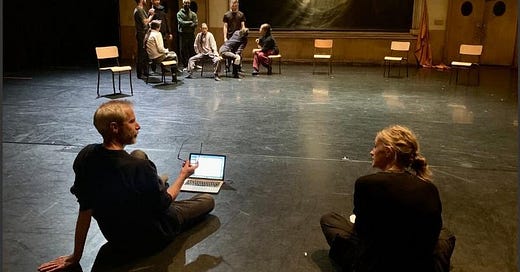Assembly Hall, the latest collaboration by the brilliant Jonathon Young and Crystal Pite, is a peculiar beast. I enjoyed talking to the creators about it (the duo-interview is in the Globe today and online since last night) and about all the roads wandered and not taken that brought them to the Hall as it is now. The piece is an homage to community centres, school gyms, church basements and amateur societies - as much as it is a contemplation of the medieval chansons de geste and stories that get repeated so much, they turn into archetypes and myths. It’s a play about, to echo Young and Pite, our urge to commune and the difficulty of achieving community.
A group of medieval reenactors gather for the last AGM before dissolution. Membership is dwindling, debt is growing, internal politics out of control. That’s how it starts, but the knight tales that they end up reenacting again completely take over and the reality-performance distinction dissipates. The tale of Perceval - who stumbles onto an order around a king whose wound just won’t heal, then doesn’t ask the right question and misses the opportunity to be the dashing stranger who fixes the kingdom - played an important part in the making of the piece. There is no grail in Assembly Hall, however, and the wound is abstract and belongs to a damsel in distress: it is her bereaved heart after the loss of her spouse.
(Young told me he watched a Met in HD performance of Francois Girard’s blood-soaked take on Wagner’s Parsifal to be able to compare how the medieval Perceval differs from the late Romantic one. The myth has picked up a lot of Christian iconography along the way, and the knights of the Grail in Wagner he found excessively pious. That particular production too heightens the difference between the dryness of the land (male domain), the bleeding King (ahem) and Kundry’s leaky female unruliness.)
“Here is a group of people who are still gathered around this wound, still seem bound by it,” Young says in the interview. This sentences stayed with me.
Who is this new play for? I’d say not expressly for Canadians or Americans, for whom medieval era doesn’t mean a whole lot — it’s something that happened elsewhere, while we can only boast pseudo-Gothic architecture — but for the European co-producers, which are a number of well-known theatre and dance companies from Scotland, England, France and Italy. For Europeans, this piece will be about how we cope with history; the many ways we manipulate memory; how we use history to build group belonging or to cast some people out.
The two creators give the recent Canadian struggles with history and group belonging a verrrry wide berth. So much so that Assembly Hall reads as escapism. The harder thing would have been to deal directly with more locally recognizable delusions, panics, mob behaviour, fantasies, phantasms, reenactments. (What is the land acknowledgement we heard at the beginning of the show if not a reenactment?)
“Here is a group of people who are still gathered around this wound, still seem bound by it.”
That’s very much Canada, I thought. What have the last few years been, during which the settler-indigenous divide became irreconcilable, if not that? Haven’t we been gathering around the phantasmic genocides, and the intuited, imagined mass graves which no one wants to even begin digging so that the presumed victims could be identified and given proper burial? Have we not been in thrall of the notions of ceded and unceded territories, and what does each mean - and haven’t we been worshipping the land, the mythical land, primordially owned by one ethnic group only, at the beginning of every public gathering?
David Frum said something interesting in a recent conversation with Rudyard Griffiths:
“If you have systems of belief that are defenceless to explain why… the whole concept of indigeneity is meaningless, and why the whole concept of settlership is equally meaningless, if a country like Canada can’t explain that, then a country like Canada lacks the wherewithal for an intellectual self-defence.”
We are in complete thrall to this division. Yet it is entirely phantasmatic. We all occupy the same time frame, indigenous and settler and immigrant alike. There isn’t a group of people who remain preserved in their (imagined, presumed) pre-contact innocence, with Nature on speed dial and a flawless talent for resource management on one side, and the rest of us on the other.
So Assembly Hall cold be about Canada too, if you look at it a certain way. But I don’t believe the creators wanted it to be about that particular mess. I wish they had.
Critiquing the critic
I missed this debate while it was at its hottest and only stumbled upon it yesterday, but the comments are still being posted on this piece by theatre critic Lynn Slotkin on the state of Canadian theatre criticism and theatre itself. Many were offended, as you can see, and many impute HARM. Slotkin lists some of the developments that she’s noticed that everybody I know has been talking about - only privately. Few critics and theatre professionals dare to raise it publicly. It helps however when you run your own media platform, as Lynn has been for many years, and you can’t be fired for wrongthink. Gotta adore the ad hominems by the equity-worshipping commenters along the lines of “but you’re just a blogger”. I thought you were on the side of the little guy, the scrappy outsider? Jokers.
Anyway, gird up your loins before you embark on the comments: this is how the people who run Canadian theatre right now think. It’s big of Slotkin to keep the comments open to all and sundry and anonymous; I know I wouldn’t. I am just a tourist in theatre criticism — I am more at home in opera criticism — but Slotkin cares deeply about the beat.



